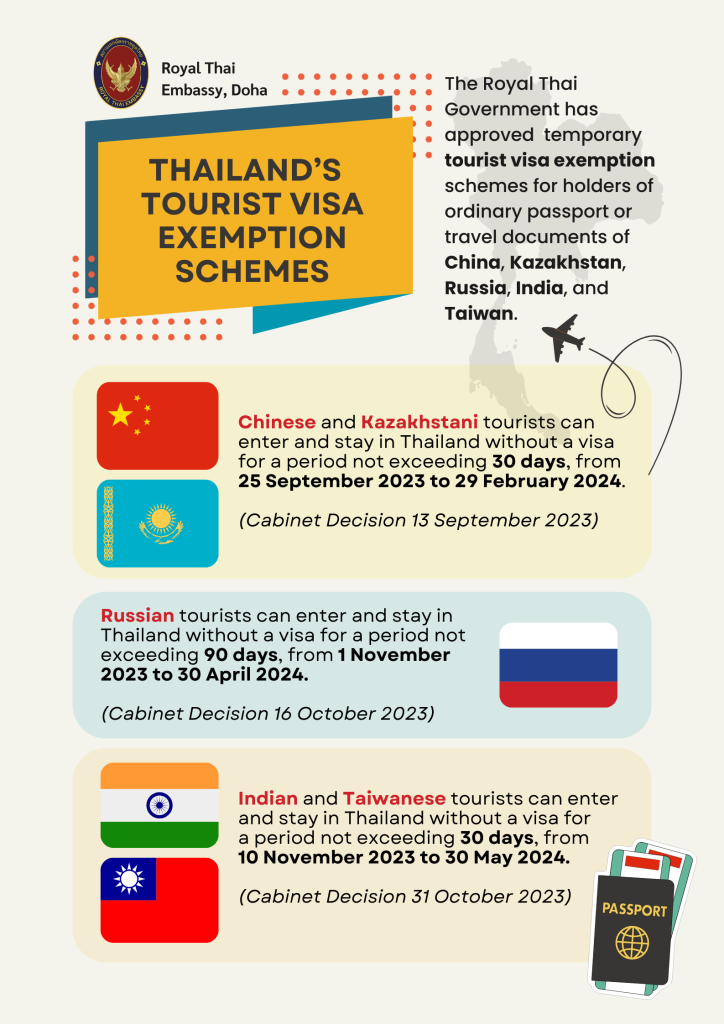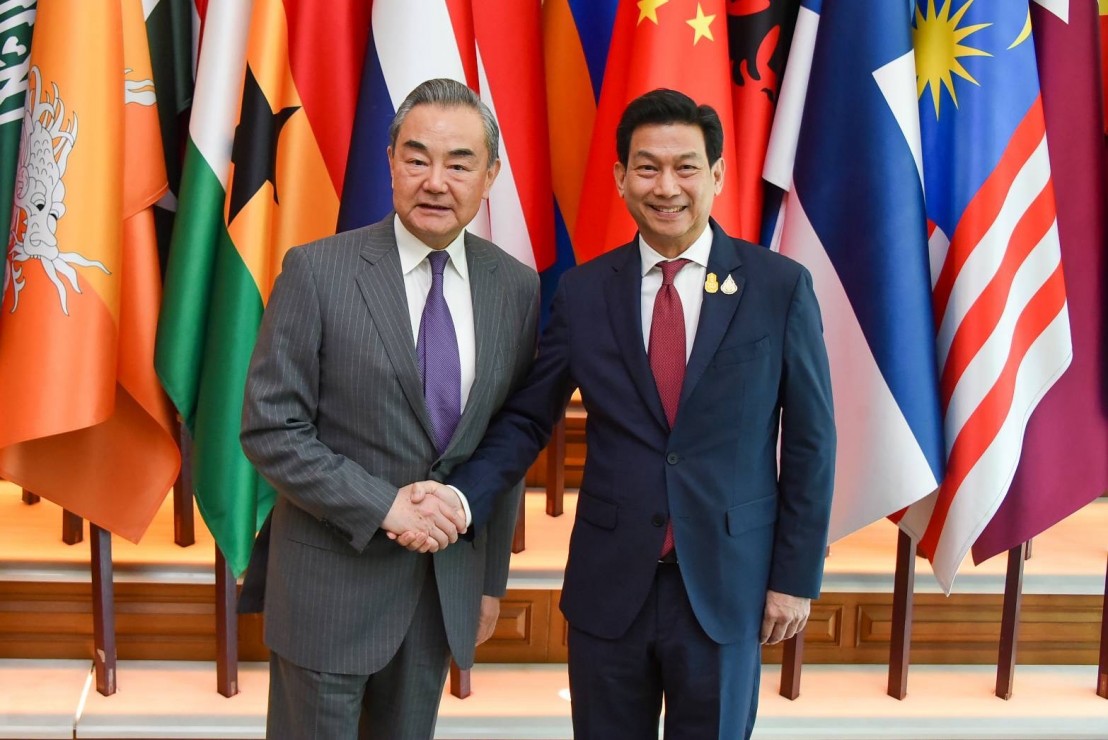The close ties between China and Thailand are poised to provide a substantial economic boost to Thailand. Chinese Foreign Minister Wang Yi announced on Sunday that the two countries will officially enter a “visa-free era” starting from March 1, following the signing of a mutual visa exemption agreement. This move is expected to significantly increase the number of Chinese tourists visiting Thailand, fostering stronger people-to-people exchanges.
Wang emphasized the familial bond between China and Thailand, expressing the importance of forging closer friendships and stronger bonds. The minister highlighted the depth of the bilateral relationship, emphasizing that China sees Thailand as a diplomatic priority among neighboring countries. China values Thailand’s commitment to the one-China principle and its active support for global initiatives, such as the Global Development Initiative, the Global Security Initiative, and the Global Civilization Initiative.
As the 50th anniversary of China-Thailand diplomatic relations approaches, Wang envisions a bright future for mutually beneficial cooperation. China is Thailand’s largest trading partner and the largest source of foreign investment. The two sides have agreed to accelerate the development of the China-Thailand Railway, implement the China-Laos-Thailand Connectivity Development Corridor Outlook, and expedite the opening of the central line of the Trans-Asian Railway.

To further deepen economic ties, China plans to import more specialty agricultural products from Thailand, support Chinese companies in investing and growing in Thailand, and encourage cooperation in new energy vehicles, the digital economy, and green development. Both countries also aim to strengthen law enforcement and security cooperation, creating a safe environment for exchanges and cooperation.
In the face of a changing and turbulent international environment, Wang underscored the commitment to the five principles of peaceful coexistence, advocating for true multilateralism and open regionalism. China and Thailand, along with other ASEAN members, plan to build a peaceful, safe, prosperous, and amicable home, accelerate Code of Conduct (COC) consultations, and uphold ASEAN centrality.
China supports Thailand in serving as the rotating chair of the Lancang-Mekong Cooperation and developing a Mekong-Lancang community for peace and prosperity. As the two countries approach the 50th anniversary milestone, guided by important consensus between their leaders, China is ready to work with Thailand to deepen the building of a stable, prosperous, and sustainable China-Thailand community with a shared future, providing stability and certainty to the global landscape.
China Inbound Tourism to Thailand: A Boon for Economic Growth
Tourism has long been a key driver of economic growth for many nations, and Thailand stands as a shining example of a country that has leveraged its unique attractions to become a popular destination. In recent years, the influx of Chinese tourists to Thailand has seen a significant surge, contributing substantially to the Thai economy. This article explores the impact of China inbound tourism on Thailand’s economic landscape and the mutually beneficial relationship between the two nations.
The Rise of Chinese Tourism to Thailand: Thailand’s picturesque landscapes, rich cultural heritage, and vibrant cities have made it a top choice for international travelers. Among these, Chinese tourists have become a dominant force, with millions flocking to the Land of Smiles annually. The rise of China’s middle class, increased disposable income, and simplified travel procedures have all played pivotal roles in this tourism boom.

Economic Impact: The economic benefits stemming from Chinese tourism to Thailand are multifaceted and extend across various sectors:
- Boost to GDP: Chinese tourists contribute significantly to Thailand’s Gross Domestic Product (GDP) through spending on accommodation, dining, shopping, and entertainment. The tourism sector is a major contributor to Thailand’s GDP, and the surge in Chinese arrivals has fueled its growth.
- Job Creation: The influx of Chinese tourists has led to an increased demand for hospitality and service-related jobs. Hotels, restaurants, tour operators, and various other service industries have seen job creation, providing employment opportunities for the local workforce.
- Infrastructure Development: To accommodate the growing number of visitors, Thailand has invested in expanding and enhancing its tourism infrastructure. This includes the development of airports, transportation networks, and tourist facilities, which not only benefits the tourism sector but also the overall economy.
- Cultural Exchanges: Increased interaction between Chinese tourists and the Thai population fosters cultural exchanges, leading to a deeper understanding and appreciation of each other’s heritage. This cultural diplomacy can have positive diplomatic implications for both nations.
Challenges and Opportunities: While the influx of Chinese tourists brings economic prosperity, it also presents challenges such as environmental concerns, strain on local resources, and the need for sustainable tourism practices. Thailand has an opportunity to balance the economic benefits with environmental sustainability, ensuring a harmonious coexistence.
The surge in Chinese tourism to Thailand has undeniably become a cornerstone of the nation’s economic growth. The economic benefits extend beyond mere monetary gains, fostering cultural understanding and diplomatic ties. As both nations continue to navigate the evolving landscape of global tourism, the relationship between China and Thailand stands as a testament to the positive impact of cross-border travel on economic prosperity and international relations.
Unveiling the Dynamics of Cross-Border Trade: China and Thailand’s Digital Economic Integration along the Belt and Road
In an era defined by globalization and digital connectivity, cross-border trade has emerged as a critical factor in the economic relations between nations. Among the myriad partnerships, the collaboration between China and Thailand stands out as a dynamic force, fueled by the digital economy and the ambitious Belt and Road Initiative (BRI). This article delves into the intricacies of cross-border trade between China and Thailand, exploring the role of the digital economy and the transformative impact of the Belt and Road.
Digital Economy’s Role in Cross-Border Trade: The digital economy has become a linchpin in modern international trade, redefining traditional business models and enhancing efficiency. In the context of China-Thailand trade relations, the digital economy has played a pivotal role in streamlining processes, reducing barriers, and fostering innovation.
- E-Commerce Platforms: Cross-border e-commerce platforms have witnessed a surge in popularity, providing consumers and businesses in China and Thailand with direct access to each other’s markets. This has facilitated the seamless exchange of goods, fostering a more inclusive and dynamic trade environment.
- Digital Payment Solutions: The adoption of digital payment solutions has eliminated the complexities associated with cross-border transactions. Chinese tourists in Thailand, for instance, can utilize digital payment platforms, enhancing the ease and speed of financial transactions.
- Data-Driven Insights: The digital era has ushered in an abundance of data, enabling businesses to make informed decisions. Chinese and Thai enterprises engaged in cross-border trade leverage data analytics to understand market trends, consumer behavior, and optimize supply chain management.
Belt and Road Initiative’s Transformative Impact: China’s Belt and Road Initiative, a vast infrastructure and economic development project, has further catalyzed cross-border trade with Thailand. The initiative aims to enhance connectivity, promote trade, and foster economic cooperation across the globe.
- Infrastructure Development: The BRI has facilitated the development of crucial infrastructure, including transportation networks and logistics hubs. This infrastructure not only facilitates the movement of goods but also enhances the overall efficiency of cross-border trade.
- Trade Facilitation: By promoting policy coordination, trade facilitation, and financial integration, the BRI has created an environment conducive to cross-border trade. This has resulted in a more seamless exchange of goods and services between China and Thailand.
- Economic Integration: The BRI promotes economic integration by fostering collaboration in various sectors, including technology, manufacturing, and finance. This integration not only strengthens economic ties but also promotes mutual understanding and cultural exchange.
While the digital economy and the Belt and Road Initiative present myriad opportunities, challenges such as regulatory disparities, cybersecurity concerns, and environmental considerations must be addressed. Striking a balance between fostering economic growth and ensuring sustainability is paramount for the long-term success of cross-border trade.
The cross-border trade relationship between China and Thailand, shaped by the digital economy and the Belt and Road Initiative, exemplifies the transformative power of international collaboration. As both nations continue to navigate the complexities of the global economy, the digital age and infrastructure initiatives like the BRI will undoubtedly play pivotal roles in shaping the future of their economic partnership.
Shayne Heffernan









